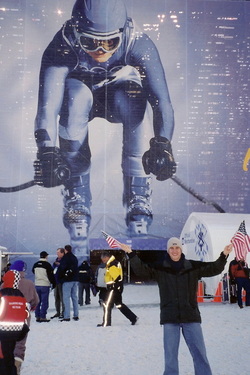| I’m not a fan of bringing the Olympics back to Utah, but I am forced to admit that if any place in the world could return sanity to a worldwide spectacle that is spending its way into oblivion, this is the place. Perhaps the Chicago Tribune said it best in an editorial two years ago. When the United States Olympic Committee decides which city to bid for the 2026 Winter Games, “Salt Lake is the best choice — if only to make the IOC look like fools for rejecting it,” the paper said. The IOC is the International Olympic Committee, whose members embroiled the 2002 Salt Lake games in a bribery scandal. The Tribune said it wasn’t convinced the IOC had changed, noting its recent penchant to entertain bids from countries |
| | where media scrutiny is curtailed and corruption abounds. Two things now return this subject to the spotlight. One is the ongoing effort by local politicians to bid for the 2026 Games. Gov. Gary Herbert has expressed his support (although the Legislature this year failed to pass a joint resolution directing the Utah Sports Commission to work with other entities to support a bid). The other is a newly released academic study published in the Journal of Economic Perspectives that pokes holes in many of the most popular arguments cities make for hosting the games. “Going for the Gold: The Economics of the Olympics” was authored by two economics professors, Robert A. Baade of Lake Forest College in Illinois, and Victor A. Matheson of College of the Holy Cross in Massachusetts. It draws the “overwhelming conclusion” that “in most cases the Olympics are a money-losing proposition for host cities...” Baade and Matheson said their research lends credence to an old economic rule of thumb: “If one wishes to know the true economic impact of an event, take whatever numbers the promoters are touting and move the decimal point one place to the left.” Brazil’s already stressed economy is being challenged by $10 billion-plus cost of this summer’s games. Already, protests there have attracted thousands of Brazilians concerned with waste and corruption. The Sochi games in 2014 cost an estimated $51 billion – money spent with virtually no oversight. Democratic countries with free media have dropped out of bidding in recent years. Norway withdrew after news stories revealed a litany of costly demands the IOC would place on the country, including special highway lanes dedicated full-time to the exclusive use of IOC members. The study shows that even the Salt Lake games, which turned a small profit, did not produce promised benefits. One of these was the state’s prediction of 35,000 new jobs, which the authors, citing a previous study, say turned out to be about 4,000 to 7,000 jobs. This, they wrote, “amounts to about $300,000 in federal government spending per job created.” And the games actually led to a 9.9 percent drop in skier days during the winter of 2002, probably because people expected slopes would be too crowded. So why, given this, do I say Utah is the best place to host a future Olympics? For one thing, Utah still has the venues and uses them for international competitions. Construction is one of the major costs of hosting the games. For another, the study cites Salt Lake and Barcelona as the only two recent host cities that were “put on the map” by the games. Utah ski resorts saw a 20.4 percent increase in skier visits from the year before the Olympics until the 2014-15 season, which compares to only 8 percent in Colorado. The study suggests the IOC select “three Winter Olympic venues throughout the world that would rotate the staging duties.” Otherwise, different cities will keep having to spend billions every four years, which enriches only builders and, depending on the country, oligarchs. The Chicago Tribune said the IOC would go back to Salt Lake, “if it could recognize its own hypocrisy.” And there’s your problem. Despite its obvious advantages, I doubt a future Utah bid would be free from huge expenditures forced on it by the IOC. Which is why I still think the state is better off contenting itself with happy memories of 2002. |


 RSS Feed
RSS Feed

